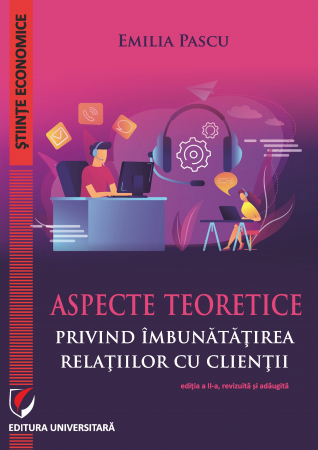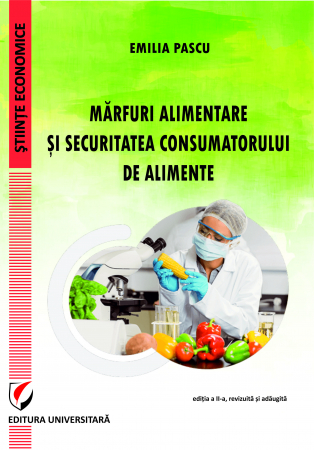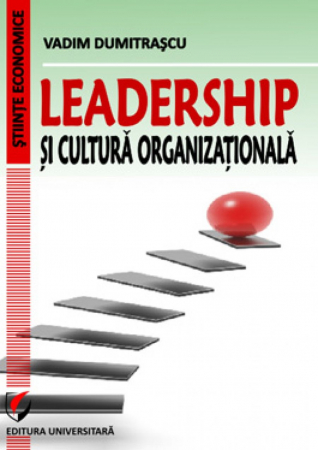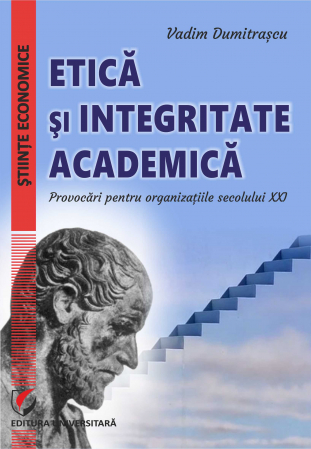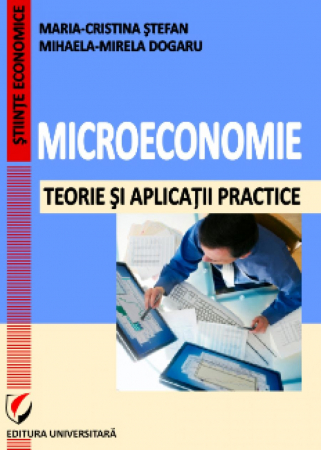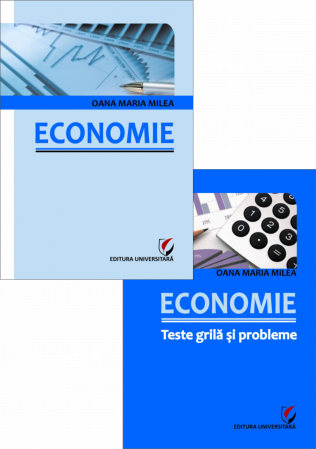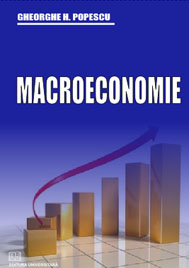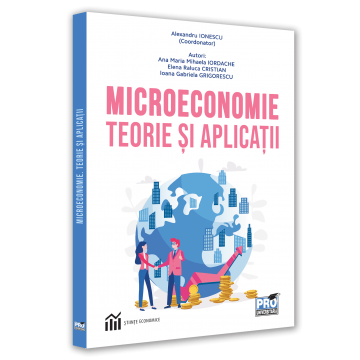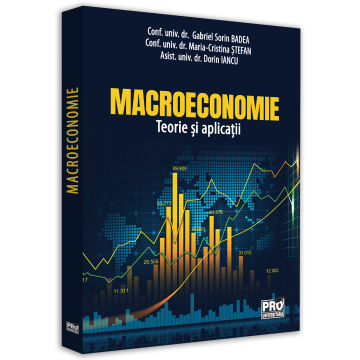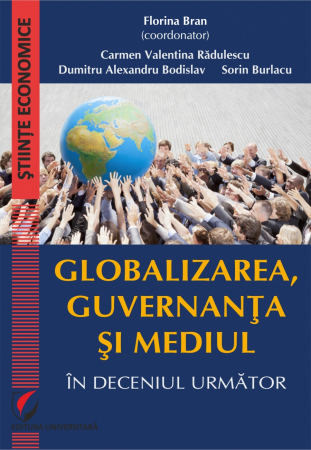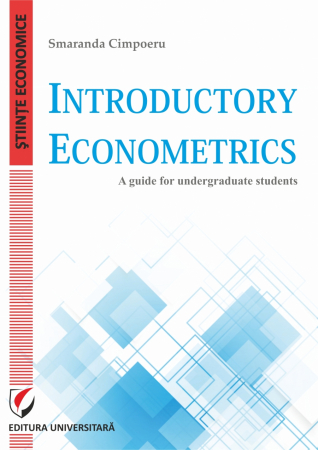Manuscript proposals: info@editurauniversitara.ro / 0745 204 115 //// Tracking orders Individuals / Sales:0745 200 718 / 0745 200 357 Orders Legal entities: 0721 722 783
Publisher: Editura Universitara
Author: Nicoleta Radneantu
ISBN: 978-606-28-0039-0
DOI: 10.5682/9786062800390
Publisher year: 2014
Edition: I
Pages: 197
Product Code:
9786062800390
Do you need help?
0745 200 718
/
0745 200 357
- Description
- Download (1)
- Authors
- Content
- More details
- Where to find it
- Reviews (0)
The main idea from which this work starts is that of change, of the evolution of humanity, which led to the achievement of a level of knowledge necessary and sufficient to create the premises for the transition from industrial society to a new economic and social reality - the knowledge-based society.
The specific problems of the knowledge-based society and the afferent organizations (knowledge-based organizations) are of maximum topicality and importance in the conditions in which they put their imprint on all fields of activity (economic, social, political, etc.). Accounting does not remain outside this phenomenon, especially since knowledge - the central element of the new type of society / economy / organization - are intangible assets whose importance can no longer be ignored.
In this context, the paper proposed an approach that started from the concept of "knowledge-based society," continued with that of "knowledge-based organization" and reached "intangible assets" - as characteristic elements of this new economic and social realities.
One cannot talk about "capitalizing on accounting information in the conditions of the knowledge-based society" as long as knowledge, intellectual capital, customer relations, relations with suppliers, alliances, partnerships, etc., that is, intangible assets that contribute most to the value market share of companies - are not properly recognized, valued, recorded and reported to the accountant. Therefore, in the paper we dealt extensively with the issue of intangible assets in the context of the knowledge-based society, insisting on:
- the characteristics of knowledge-based organizations in Romania;
- the perception of the managers from Romania regarding the intangible assets (existing, but not registered in accounting, as well as those that are currently registered);
- the importance that managers in Romania attach to intangible assets not currently included in the financial statements;
The paper also presents the conclusions of a comparative study conducted using two samples of companies listed on the Bucharest Stock Exchange - companies classified as "knowledge-based" and companies in the Top 100 issuers by capitalization.
The specific problems of the knowledge-based society and the afferent organizations (knowledge-based organizations) are of maximum topicality and importance in the conditions in which they put their imprint on all fields of activity (economic, social, political, etc.). Accounting does not remain outside this phenomenon, especially since knowledge - the central element of the new type of society / economy / organization - are intangible assets whose importance can no longer be ignored.
In this context, the paper proposed an approach that started from the concept of "knowledge-based society," continued with that of "knowledge-based organization" and reached "intangible assets" - as characteristic elements of this new economic and social realities.
One cannot talk about "capitalizing on accounting information in the conditions of the knowledge-based society" as long as knowledge, intellectual capital, customer relations, relations with suppliers, alliances, partnerships, etc., that is, intangible assets that contribute most to the value market share of companies - are not properly recognized, valued, recorded and reported to the accountant. Therefore, in the paper we dealt extensively with the issue of intangible assets in the context of the knowledge-based society, insisting on:
- the characteristics of knowledge-based organizations in Romania;
- the perception of the managers from Romania regarding the intangible assets (existing, but not registered in accounting, as well as those that are currently registered);
- the importance that managers in Romania attach to intangible assets not currently included in the financial statements;
The paper also presents the conclusions of a comparative study conducted using two samples of companies listed on the Bucharest Stock Exchange - companies classified as "knowledge-based" and companies in the Top 100 issuers by capitalization.
-
Valorificarea informatiilor contabile in economia bazata pe cunostinte
Download
NICOLETA RADNEANTU
CHAPTER I
KNOWLEDGE - BASED SOCIETY - BOUNDARIES AND CHARACTERISTICS / 9
1.1. Conceptual approaches to the knowledge - based society / 9
1.2. History of the concept of "knowledge-based society" / 14
1.3. Characteristics of the knowledge - based society / 17
1.4. Knowledge - based organizations / 22
1.4.1. Knowledge - based organization - definition, concept, approaches / 22
1.4.2. Characteristics of the company / organization based on knowledge / 31
1.5. Knowledge-based society evaluation indicators. Where is Romania? / 34
CHAPTER II
THE IMPACT OF THE KNOWLEDGE-BASED SOCIETY ON ACCOUNTING / 40
2.1. Transforming accounting paradigms in the context of the knowledge - based society / 40
2.1.1. Increasing the importance of intangible assets / 41
2.1.2. Green accounting / Ecological accounting / 44
2.1.3. Increasing the importance of information technology and Business Intelligence solutions / 48
2.1.4. A new vision on the accounting profession / 50
2.1.5. Good corporate governance / 51
2.2. Romanian accounting in the context of the knowledge - based society / 54
CHAPTER III
ASPECTS REGARDING THE RECOGNITION OF INTANGIBLE ASSETS IN THE CONTEXT OF THE KNOWLEDGE-BASED SOCIETY / 75
3.1. Aspects regarding the recognition of intangible assets at international level / 75
3.2. Comparison of the accounting treatment of intangible assets applied by IAS / IFRS, US GAAP and UK GAAP / 84
3.3. The accounting normalization process regarding the recognition, valuation and reporting of intangible assets in Romania / 89
CHAPTER IV
METHODS OF VALUATION OF INTANGIBLE ASSETS IN THE CONTEXT OF THE KNOWLEDGE-BASED SOCIETY / 96
4.1. Approaches to intangible asset valuation methods / 96
4.2. Methods for valuing intangible assets adapted to knowledge-based organizations at international and national level / 101
4.2.1. Methods of valuation of intangible assets internationally - Valuation method IC Rating / 102
4.2.2. Methods for valuing intangible assets used in Romania. Valuation of intangible assets by the income capitalization method / 107
CHAPTER V
EMPIRICAL STUDY ON THE IMPORTANCE, RECOGNITION AND VALUATION IN ACCOUNTING OF INTANGIBLE ASSETS IN THE CONTEXT OF THE KNOWLEDGE-BASED SOCIETY / 111
5.1. Definition, purpose and methodology of the research / 112
5.2. Research results: data processing and analysis / 115
5.2.1. Analysis of the answers received in accordance with the first stated objective: Making a comparison between listed knowledge-based companies and top 100 companies, regarding their characteristics (number of employees, type of share capital, turnover, total assets, degree innovation, information system) / 116
5.2.2. Analysis of the answers received in accordance with the second stated objective: Making a comparison between companies based on knowledge listed on BVB and Top 100 companies on intangible assets not currently included in the financial statements (existing, valuation and reporting needs) / 123
5.2.3. Analysis of the answers received in accordance with the third stated objective - Making a comparison between knowledge-based organizations and Top 100 organizations in relation to the importance of intangible elements not included in the current financial statements / 126
5.2.4. Analysis of the answers received in accordance with the fourth stated objective - making a comparison between knowledge-based organizations and organizations in the Top 100 on managers' perceptions of the current way of recording, valuing and reporting intangible assets / 141
CONCLUSIONS / 144
BIBLIOGRAPHY / 149
ANNEXES / 157
KNOWLEDGE - BASED SOCIETY - BOUNDARIES AND CHARACTERISTICS / 9
1.1. Conceptual approaches to the knowledge - based society / 9
1.2. History of the concept of "knowledge-based society" / 14
1.3. Characteristics of the knowledge - based society / 17
1.4. Knowledge - based organizations / 22
1.4.1. Knowledge - based organization - definition, concept, approaches / 22
1.4.2. Characteristics of the company / organization based on knowledge / 31
1.5. Knowledge-based society evaluation indicators. Where is Romania? / 34
CHAPTER II
THE IMPACT OF THE KNOWLEDGE-BASED SOCIETY ON ACCOUNTING / 40
2.1. Transforming accounting paradigms in the context of the knowledge - based society / 40
2.1.1. Increasing the importance of intangible assets / 41
2.1.2. Green accounting / Ecological accounting / 44
2.1.3. Increasing the importance of information technology and Business Intelligence solutions / 48
2.1.4. A new vision on the accounting profession / 50
2.1.5. Good corporate governance / 51
2.2. Romanian accounting in the context of the knowledge - based society / 54
CHAPTER III
ASPECTS REGARDING THE RECOGNITION OF INTANGIBLE ASSETS IN THE CONTEXT OF THE KNOWLEDGE-BASED SOCIETY / 75
3.1. Aspects regarding the recognition of intangible assets at international level / 75
3.2. Comparison of the accounting treatment of intangible assets applied by IAS / IFRS, US GAAP and UK GAAP / 84
3.3. The accounting normalization process regarding the recognition, valuation and reporting of intangible assets in Romania / 89
CHAPTER IV
METHODS OF VALUATION OF INTANGIBLE ASSETS IN THE CONTEXT OF THE KNOWLEDGE-BASED SOCIETY / 96
4.1. Approaches to intangible asset valuation methods / 96
4.2. Methods for valuing intangible assets adapted to knowledge-based organizations at international and national level / 101
4.2.1. Methods of valuation of intangible assets internationally - Valuation method IC Rating / 102
4.2.2. Methods for valuing intangible assets used in Romania. Valuation of intangible assets by the income capitalization method / 107
CHAPTER V
EMPIRICAL STUDY ON THE IMPORTANCE, RECOGNITION AND VALUATION IN ACCOUNTING OF INTANGIBLE ASSETS IN THE CONTEXT OF THE KNOWLEDGE-BASED SOCIETY / 111
5.1. Definition, purpose and methodology of the research / 112
5.2. Research results: data processing and analysis / 115
5.2.1. Analysis of the answers received in accordance with the first stated objective: Making a comparison between listed knowledge-based companies and top 100 companies, regarding their characteristics (number of employees, type of share capital, turnover, total assets, degree innovation, information system) / 116
5.2.2. Analysis of the answers received in accordance with the second stated objective: Making a comparison between companies based on knowledge listed on BVB and Top 100 companies on intangible assets not currently included in the financial statements (existing, valuation and reporting needs) / 123
5.2.3. Analysis of the answers received in accordance with the third stated objective - Making a comparison between knowledge-based organizations and Top 100 organizations in relation to the importance of intangible elements not included in the current financial statements / 126
5.2.4. Analysis of the answers received in accordance with the fourth stated objective - making a comparison between knowledge-based organizations and organizations in the Top 100 on managers' perceptions of the current way of recording, valuing and reporting intangible assets / 141
CONCLUSIONS / 144
BIBLIOGRAPHY / 149
ANNEXES / 157
The main idea from which this work starts is that of change, of the evolution of humanity, which led to the achievement of a level of knowledge necessary and sufficient to create the premises for the transition from industrial society to a new economic and social reality - the knowledge-based society.
The specific problems of the knowledge-based society and the afferent organizations (knowledge-based organizations) are of maximum topicality and importance in the conditions in which they put their imprint on all fields of activity (economic, social, political, etc.). Accounting does not remain outside this phenomenon, especially since knowledge - the central element of the new type of society / economy / organization - are intangible assets whose importance can no longer be ignored.
In this context, the paper proposed an approach that started from the concept of "knowledge-based society," continued with that of "knowledge-based organization" and reached "intangible assets" - as characteristic elements of this new economic and social realities.
One cannot talk about "capitalizing on accounting information in the conditions of the knowledge-based society" as long as knowledge, intellectual capital, customer relations, relations with suppliers, alliances, partnerships, etc., that is, intangible assets that contribute most to the value market share of companies - are not properly recognized, valued, recorded and reported to the accountant. Therefore, in the paper we dealt extensively with the issue of intangible assets in the context of the knowledge-based society, insisting on:
- the characteristics of knowledge-based organizations in Romania;
- the perception of the managers from Romania regarding the intangible assets (existing, but not registered in accounting, as well as those that are currently registered);
- the importance that managers in Romania attach to intangible assets not currently included in the financial statements;
The paper also presents the conclusions of a comparative study conducted using two samples of companies listed on the Bucharest Stock Exchange - companies classified as "knowledge-based" and companies in the Top 100 issuers by capitalization.
In Chapter I, entitled "The society based on knowledge - boundaries and characteristics" are pursued the objectives:
• achieving a conceptual delimitation regarding the society / economy based on knowledge / the society based on knowledge / information age / new economy;
• determining the main factors that led to the emergence of the knowledge-based society / economy;
• presenting a short history of the concept of "knowledge-based society";
• presentation of the characteristics of the knowledge-based society;
• studying the main changes that occurred after the transition to the knowledge-based society / economy, at the level of the production process, at the organizational and managerial level and at the level of the work process;
• presentation of the main approaches found in the international literature on knowledge-based organizations (concept, types, structure);
• presentation of the characteristics of knowledge-based organizations;
• analysis of the development stage of the knowledge-based society in Romania using the Knowledge Index (KI), the Knowledge-Based Economy Index (KEI) and the Dashboard (Basic Scorecard).
Chapter II, entitled "The impact of the knowledge-based society on accounting" aims to:
• identification of the main changes in accounting as a result of the transition from the industrial company to the knowledge-based society;
• analysis and presentation of new accounting paradigms in Romania and internationally.
Chapter III, entitled "Aspects regarding the recognition of intangible assets in the context of the knowledge-based society" has the following objectives:
• presentation of the main definitions and typologies of intangible assets present in the international literature (Sveiby; Lev; Brooking; Edvinsson; Malone; Reilly; Schweihs; OECD; IAS 38; Marr; Black, Carns; Richardson; etc.);
• conducting a comparative study (IAS / IFRS; US GAAP; UK GAAP) on the definition and recognition of intangible assets;
• presentation of the legal framework regarding the recognition, evaluation and reporting of intangible assets in Romania.
In the fourth chapter - "Methods for evaluating intangible assets in the context of the knowledge-based society" - the objectives are pursued:
• classification of the main methods for valuing intangible assets used internationally;
• presentation of two methods for evaluating intangible assets adapted to knowledge-based organizations, respectively:
- "IC Rating" method with example on Goodyear Tire and Rubber, Turkey;
- the “Income capitalization” method with exemplification on the company TransNet S.A. Romania.
Chapter V comaintains an "Empirical Study on the Importance, Recognition and Evaluation of Intangible Assets in the Context of the Knowledge-Based Society"; the following objectives are pursued:
• making a comparison between knowledge-based companies and Top 100 companies regarding their characteristics (field of activity, number of employees, type of share capital, turnover, total assets, degree of innovation, information system);
• making a comparison between knowledge-based companies and Top 100 companies regarding intangible assets not currently included in the financial statements (existing, valuation and reporting needs);
• making a comparison between knowledge-based companies and Top 100 organizations in connection with the importance given by managers to intangible elements not included in the current financial statements;
• making a comparison between knowledge-based companies and Top 100 organizations on managers' perceptions of the current valuation and reporting of intangible assets.
The specific problems of the knowledge-based society and the afferent organizations (knowledge-based organizations) are of maximum topicality and importance in the conditions in which they put their imprint on all fields of activity (economic, social, political, etc.). Accounting does not remain outside this phenomenon, especially since knowledge - the central element of the new type of society / economy / organization - are intangible assets whose importance can no longer be ignored.
In this context, the paper proposed an approach that started from the concept of "knowledge-based society," continued with that of "knowledge-based organization" and reached "intangible assets" - as characteristic elements of this new economic and social realities.
One cannot talk about "capitalizing on accounting information in the conditions of the knowledge-based society" as long as knowledge, intellectual capital, customer relations, relations with suppliers, alliances, partnerships, etc., that is, intangible assets that contribute most to the value market share of companies - are not properly recognized, valued, recorded and reported to the accountant. Therefore, in the paper we dealt extensively with the issue of intangible assets in the context of the knowledge-based society, insisting on:
- the characteristics of knowledge-based organizations in Romania;
- the perception of the managers from Romania regarding the intangible assets (existing, but not registered in accounting, as well as those that are currently registered);
- the importance that managers in Romania attach to intangible assets not currently included in the financial statements;
The paper also presents the conclusions of a comparative study conducted using two samples of companies listed on the Bucharest Stock Exchange - companies classified as "knowledge-based" and companies in the Top 100 issuers by capitalization.
In Chapter I, entitled "The society based on knowledge - boundaries and characteristics" are pursued the objectives:
• achieving a conceptual delimitation regarding the society / economy based on knowledge / the society based on knowledge / information age / new economy;
• determining the main factors that led to the emergence of the knowledge-based society / economy;
• presenting a short history of the concept of "knowledge-based society";
• presentation of the characteristics of the knowledge-based society;
• studying the main changes that occurred after the transition to the knowledge-based society / economy, at the level of the production process, at the organizational and managerial level and at the level of the work process;
• presentation of the main approaches found in the international literature on knowledge-based organizations (concept, types, structure);
• presentation of the characteristics of knowledge-based organizations;
• analysis of the development stage of the knowledge-based society in Romania using the Knowledge Index (KI), the Knowledge-Based Economy Index (KEI) and the Dashboard (Basic Scorecard).
Chapter II, entitled "The impact of the knowledge-based society on accounting" aims to:
• identification of the main changes in accounting as a result of the transition from the industrial company to the knowledge-based society;
• analysis and presentation of new accounting paradigms in Romania and internationally.
Chapter III, entitled "Aspects regarding the recognition of intangible assets in the context of the knowledge-based society" has the following objectives:
• presentation of the main definitions and typologies of intangible assets present in the international literature (Sveiby; Lev; Brooking; Edvinsson; Malone; Reilly; Schweihs; OECD; IAS 38; Marr; Black, Carns; Richardson; etc.);
• conducting a comparative study (IAS / IFRS; US GAAP; UK GAAP) on the definition and recognition of intangible assets;
• presentation of the legal framework regarding the recognition, evaluation and reporting of intangible assets in Romania.
In the fourth chapter - "Methods for evaluating intangible assets in the context of the knowledge-based society" - the objectives are pursued:
• classification of the main methods for valuing intangible assets used internationally;
• presentation of two methods for evaluating intangible assets adapted to knowledge-based organizations, respectively:
- "IC Rating" method with example on Goodyear Tire and Rubber, Turkey;
- the “Income capitalization” method with exemplification on the company TransNet S.A. Romania.
Chapter V comaintains an "Empirical Study on the Importance, Recognition and Evaluation of Intangible Assets in the Context of the Knowledge-Based Society"; the following objectives are pursued:
• making a comparison between knowledge-based companies and Top 100 companies regarding their characteristics (field of activity, number of employees, type of share capital, turnover, total assets, degree of innovation, information system);
• making a comparison between knowledge-based companies and Top 100 companies regarding intangible assets not currently included in the financial statements (existing, valuation and reporting needs);
• making a comparison between knowledge-based companies and Top 100 organizations in connection with the importance given by managers to intangible elements not included in the current financial statements;
• making a comparison between knowledge-based companies and Top 100 organizations on managers' perceptions of the current valuation and reporting of intangible assets.
www.editurauniversitara.ro
If you want to express your opinion about this product you can add a review.
write a review
Customer Support Monday - Friday, between 8.00 - 16.00
0745 200 718 0745 200 357 comenzi@editurauniversitara.ro
6359.png)
![Utilization of accounting information in the knowledge-based economy [1] Utilization of accounting information in the knowledge-based economy [1]](https://gomagcdn.ro/domains/editurauniversitara.ro/files/product/large/valorificarea-informatiilor-contabile-in-economia-bazata-pe-cunostinte-964-602847.jpg)

